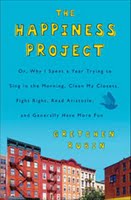
 Oftentimes, as adults, we revisit the books we've read as children and come away with an entirely new understanding of old, familiar stories. Gretchen Rubin, author of THE HAPPINESS PROJECT, recalls such an experience with the Little House series by Laura Ingalls Wilder.
Oftentimes, as adults, we revisit the books we've read as children and come away with an entirely new understanding of old, familiar stories. Gretchen Rubin, author of THE HAPPINESS PROJECT, recalls such an experience with the Little House series by Laura Ingalls Wilder.
My favorite memory of receiving a book as a gift dates back to the Christmas when I’d just turned six years old. My beautiful LITTLE HOUSE IN THE BIG WOODS was inscribed: “Merry Christmas to Gretchen, with all our love --- with the hope that you’ll love the stories about Laura and her family as much as your Mommy loved them.”
I loved this book beyond anything I’d ever read before.
I wasn’t quite able yet to read it comfortably myself, so my father would read me two chapters each night before I went to bed. I could read well enough to know when he skipped, however, and I remember taking great pleasure in scolding him when he didn’t read every word (a game that I’m now quite familiar with as the parent doing the reading!).
Every year, for the next seven years, I unwrapped the next book in the series. I couldn’t wait to read them, of course, and I’d raced through the whole series by the time I had my own set, but each year I looked forward to getting my fresh new volume.
I’ve re-visited those books as an adult, too, many times; few novels withstand multiple re-readings as well as the Little House books.
Have you read those books? Do you remember the ending of LITTLE HOUSE IN THE BIG WOODS? I didn’t understand it when I was six years old, but now I do:
She looked at Pa sitting on the bench by the hearth…She looked at Ma, gently rocking and knitting.
She thought to herself, “This is now.”
She was glad that the cozy house, and Pa and Ma and the firelight and the music, were now. They could not be forgotten, she thought, because now is now. It can never be a long time ago.
-- Gretchen Rubin
Check back later today as Suzan Colón describes the personal significance of Johanna Spyri's HEIDI.


